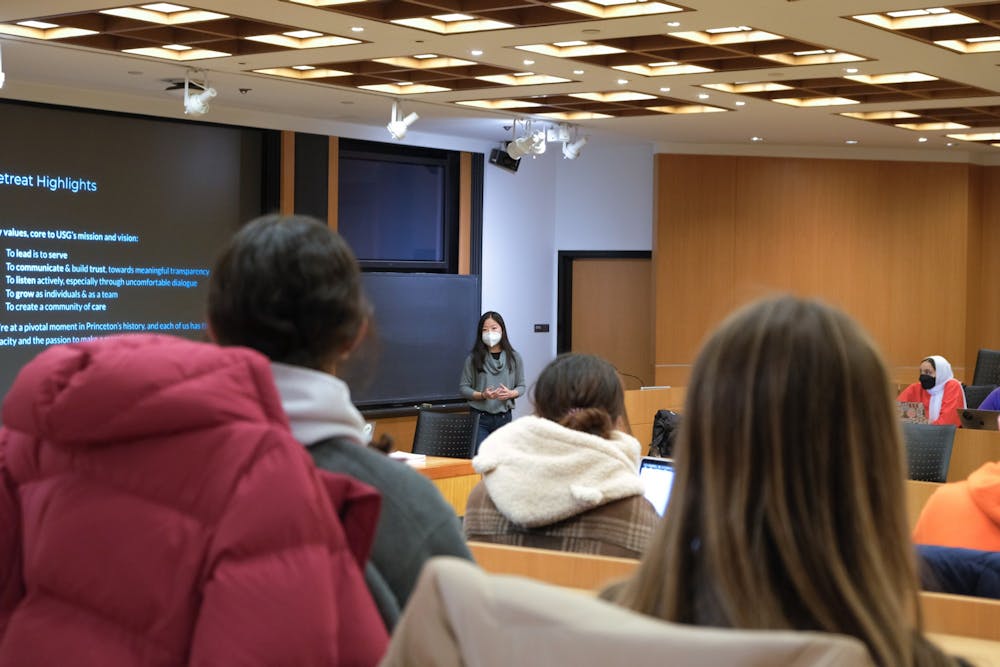In its first meeting following spring break on Sunday, March 13, the Undergraduate Student Government (USG) Senate heard mid-semester reports from three committees and unanimously approved a Campus and Community Affairs (CCA) budget increase. The Senate also discussed possible mental health-related referenda for the upcoming spring election cycle.
U-Councilor Stephen Daniels ’24, co-chair of the Mental Health Task Force, put forth two possible referenda that the student body could vote on this spring.
The first referendum would be a general funding request for the University to allocate a larger budget for mental health counselors. If the University were to adopt this recommendation, the outreach counselor program would be expanded and institutionalized. Outreach counselors work specifically with students with marginalized identities, graduate students, international students, and student-athletes.
“Outreach counselors are counselors that currently exist under the TigerWell grant, but it’s going to expire in 2024,” Daniels explained.
The second referendum would aim to gauge student interest in telehealth mental health care.
Referencing a conversation with Dr. Calvin Chin, Director of Counseling and Psychological Services (CPS), Daniels noted that “for telehealth to work and for it to make sense, students really need to want it as a resource, because otherwise we’d be spending money on something that people aren’t going to use.”
The referendum would help the task force gain a better understanding of whether students would make use of telehealth services and, if passed by the student body, “would be calling on administration to investigate different telehealth options.”
CCA Chair Isabella Shutt ’24 and Senator Kanishkh Kanodia ’23 both expressed concerns that since the posed referendum concerns a tentative policy stance, it might be better placed as a question in a USG survey being released to the student body later this semester. Nonetheless, Daniels emphasized that with finite resources, he believes it would be smart to consider a telehealth referendum in tandem with a broader budget referendum, especially as a growing student body will likely increase the demand for increased mental health resources.

Daniels said that passing a telehealth referendum this semester would give those working on the initiative “a stronger position to work with administration.” He added that a referendum would likely draw higher voter turnout than a survey would garner respondents.
USG Vice President Hannah Kapoor ’23 clarified that referenda can either be sponsored by the Senate or by individual students. Daniels said that these referenda would be better-served as Senate-sponsored, but the Senate has not yet taken a vote on the matter.
The Senate also heard updates from three committees. Shutt discussed Tigers in Town, noting that the program has seen an underrepresentation of first-year students in registration. In response, the CCA committee will be working with the first-year class government to implement a class council-funded Tigers in Town event specifically for first-years.
The committee spent $1,827.31 of its $10,000 budget on Tigers in Town in the first two weeks of this semester. With registration often filling up within minutes, Shutt proposed an increase to a $12,000 budget, which would give the program $1,575 per week through reading period and allow about 40 more students to sign up each week.

“We’re very comfortable financially,” USG Treasurer Adam Hoffman ’23 added. “So from the treasurer’s end, I think this is awesome.”
The Senate voted unanimously to approve the budget change, with Shutt abstaining.
Shutt also noted that the committee has plans to lengthen the time slots students can sign up for to give them more flexibility, while still spreading out student visits so as not to overwhelm businesses.
Upcoming plans for the CCA committee include hosting student performers at 185 Nassau Street as part of the Arts Council of Princeton’s Porchfest in April, reviving a farmers market that was previously hosted in Firestone Plaza, increasing student engagement in local communities in Trenton and Mercer County, continuing the CCA internship program, and gearing up for Princeton Restaurant Week.
Undergraduate Student Life Committee (USLC) Chair Avi Attar ’25 updated the Senate body on topics his committee has been thinking about, which include the discipline process, isolation procedures, and student health issues in response to a recent health report.
Attar solicited suggestions from the Senate on a current project involving the use of QR codes around campus to gather qualitative feedback on topics related to student life.
“You go on Tiger Confessions, you talk to your classmates and friends, and you hear that people have so much stuff to say to the administration,” Attar said.
Senator Mariam Latif ’24 asked about engagement on the feedback form that USG includes in its email newsletters. Kapoor responded that responses are “not very high — I think we’ve had a couple of submissions.”
USG President Mayu Takeuchi ’23 added that she hopes the QR code project can help USG in “providing guidance and support in case students don’t know where to reach out to” with concerns.
Diversity, Equity, and Inclusion (DEI) Committee Chair Braiden Aaronson ’25 gave a report on their committee, which has been working on building connections with DEI administrators, the USLC, the athletics department, and the Mental Health Initiative.
Aaronson will present a proposal next week in hopes of establishing DEI as a more permanent core USG committee. He also hopes to set up a focus group structure to make the DEI committee more “accessible to the student body and useful to the administration.”
USG Senate meetings are held in Robertson Hall Bowl 016 at 8 p.m. on Sunday evenings and are open to all.
Annie Rupertus is a first-year from Philadelphia and a News Staff Writer who covers USG for the ‘Prince.’ She is also a designer for the print issue. She can be reached at arupertus@princeton.edu or @annierupertus on Instagram and Twitter.








